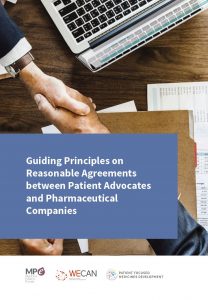Reasonable Legal Agreements between Patient Advocates and Pharmaceutical Companies
 The project “Reasonable Agreements between Patient Advocates and Pharmaceutical Companies” was initiated by WECAN in 2016 and is coordinated by Myeloma Patients Europe (MPE) in collaboration with Patient Focused Medicines Development (PFMD) and legal experts from pharmaceutical companies.
The project “Reasonable Agreements between Patient Advocates and Pharmaceutical Companies” was initiated by WECAN in 2016 and is coordinated by Myeloma Patients Europe (MPE) in collaboration with Patient Focused Medicines Development (PFMD) and legal experts from pharmaceutical companies.
The project includes representatives from 35 patient organisations, 16 pharmaceutical companies and 7 other project partners. The project aims to make the legal relationship between patient advocates and pharmaceutical companies easier and more acceptable while safeguarding the independence and interests of all parties involved.
WECAN collaborated with MPE on a survey of over 80 European patient advocates to understand perspectives and experiences of patient advocates based on consultancy, collaboration, advisory board and speaker agreements with the pharmaceutical industry. The survey highlighted pertinent issues in the contracting process, including:
- More than half of the patient advocates surveyed understood only some, a few or none of the clauses in the contracts they received.
- Around 20% of advocates rarely or never read all legal agreements in detail before signing them due to reasons such as lack of legal support, time constraints, or confusing terms.
- The length of the contracts was identified as a hurdle for advocates, and survey respondents reported they can spend almost five hours in negotiating, reading, printing, scanning and sending a contract.
- Several clauses included in contracts were highlighted as unreasonable or unfair from the patient point of view.
Based on the survey results, the RAPP project set out to streamline the legal framework between the patient community and the pharmaceutical industry, providing guidance for the content of legal contracts while maintaining reasonable safeguards for both contractual parties. The joint initiative has collectively contributed to the release of the Guiding Principles on Reasonable Agreements between Patient Advocates and Pharmaceutical Companies and four Reference Agreements for different types of engagements (Advisory Boards, Collaborations, Speaking Engagements and Consultancy).
Guiding Principles
Our “Guiding Principles for Reasonable Agreements between Patient Advocates and Pharmaceutical Companies” were developed via a collaborative approach with project partners. The Guiding Principles aim to serve as a baseline for the development of contracts and contract templates for patient advocate engagements with industry to ensure reasonable protection for signing parties and to provide guidance to patient advocates whenever they need to review a legal agreement. The goal of the Guiding Principles is not only to simplify the terms of typical agreements, but also to prevent the addition of unnecessary clauses for either party and to simplify the language of the agreements.
Each section on confidentiality, intellectual property, recordings of meetings, data protection, personal data, indemnification, remedies, conflict resolution, financial compensation, reimbursement of expenses, adverse event reporting and conflict of interest covers rationale, examples and guiding principles.
The Guiding Principles are a result of consensus work of patient experts from MPE, WECAN and PFMD as well as legal experts of the pharmaceutical companies AMGEN, Bayer, Bristol-Myers Squibb, Celgene, Janssen, MSD, Novartis, Novo Nordisk, Pfizer, Roche, Servier and Takeda. Workgroup members provided input into the drafting process, discussed areas of compromise and non-consensus, and acted as reviewers in multiple review cycles throughout their development.
Reference Agreements
Using the Guiding Principles as a basis, this project has developed four Reference Agreements for use in varied patient community engagements, including:
These Reference Agreements are intended to constitute a resource for legal parties responsible for drafting agreements with patient advocates. The Reference Agreements require tailoring by a competent legal advisor according to the needs of the users and the context of use, although flexibility has been safeguarded to ensure the templates can be used in the widest possible set of circumstances.
Adaptation on a case by case basis to comply with national legislation and language requirements is also needed. The Reference Agreements represent a sensible approach but are not a substitute for taking appropriate legal advice on the documents in question.
The fundamental objective of this collaborative project is to set a reasonable basis for contracts between pharmaceutical companies and patient advocates and their organisations. In order to facilitate the contractual process for the patient community and reduce the number of variations in these contexts, WECAN suggests that deviation from the essential principles contained in these Reference Agreements should not occur unless there is valid reasoning that is agreed by both signing parties.
Of note, the Reference Agreements provide guidance and are not a substitute for taking appropriate legal advice on the documents in question.
Toolkit
The RAPP project is also partnered with IMI PARADIGM to develop a toolkit for patient advocates. This toolkit will aid in navigating legal parameters in engagements with the pharmaceutical industry, leveraging the Guiding Principles and the Reference Agreements.
Download:
Guiding Principles on Reasonable Legal Agreements between Patient Advocates and Pharmaceutical Companies (> easy-to-print version in A4, > layouted brochure in A5)
Reference agreements:
- Consultancy (Word file)
- Community Speaker (Word file)
- Collaboration (Word file)
- Advisory Board (Word file)
- Toolkit
Case study / workshop on reasonable legal agreements (21 Feb 2019)
News article on publication of Guiding Principles (28 Nov 2018)
Presentation about project (PPT/PDF) (26 Oct 2018)

